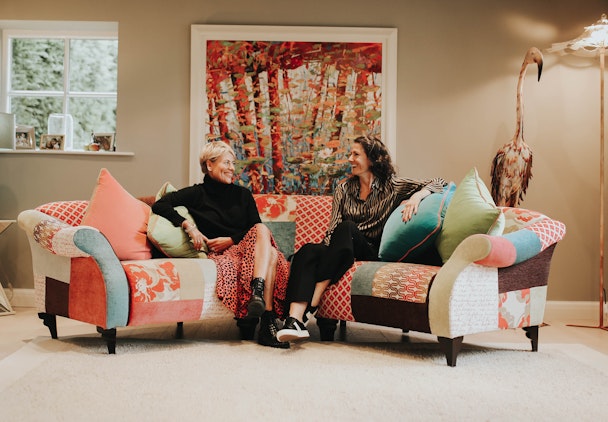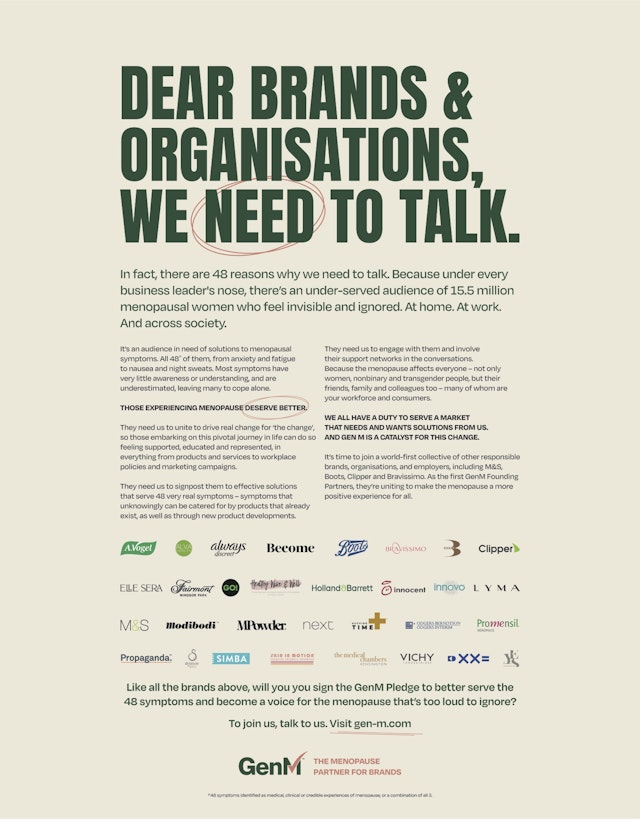The GenM agenda: co-founders say brands ‘need to talk’ more openly about menopause
After its nationwide Invisibility Report revealed the distinct lack of education and support for people going through the menopause, GenM released its open letter pushing for brands to open up the conversation and help normalize menopause for future generations. The Drum spoke to co-founders Heather Jackson and Sam Simister to find out what’s next on the agenda.

GenM founders say that ‘we need to stop teaching women to make do and mend in this period in their lives’
GenM is an organization seeking to make menopause a more positive experience for everyone. According to co-founders Heather Jackson and Sam Simister, women going through the menopause often feel “alone and invisible” due to a lack of knowledge, as well as the lack of choices offered to them by brands.
According to Gen M’s Invisibility Report, which was published last year, 87% of menopausal people feel overlooked by society and by brands; 97% feel brands should cater more to the needs and wants of menopausal people; and 91% have never seen specific advertising or marketing for menopausal products.
“There are 15.5 million perimenopausal and menopausal people throughout the UK, and it’s abundantly clear that they are underserved, and deserve much better,” says Jackson.
GenM has previously worked hard to improve the treatment of menopausal people in the workplace through its Choose to Challenge campaign. However, Jackson goes on to say that menopause is not just a workplace issue, but a societal one.
“There are 48 symptoms of menopause, yet most women can only name between three and five. So let’s be honest, if women don’t even know the symptoms of their own menopause, how can we expect men to? How can we expect organizations to? How can brands create products that cater to them, and market those products accordingly so that women know what is available to them?”
Open letter to brands
In order to highlight the responsibility of brands to cater to their menopausal customers, GenM filed an open letter, signed by 31 brands and counting, who are pledging to join GenM in using their platform to normalize the conversation around menopause, as well as create and market products that will cater to the needs of menopausal people.
Major brands including M&S and Boots have already joined GenM in co-signing an open letter to the industry in an ad that was featured in The Guardian on October 1. Jackson and Simister say GenM is now on track to reach its goal of securing 48 initial founding brand partners to represent and raise awareness of the 48 symptoms of menopause.
The letter itself asks brands from all sectors to pledge to better understand the needs of those going through menopause, use their platforms to normalize the conversation around the topic, and review how their policies, products and services can improve the menopause experience.

By joining GenM as a partner, Simister says brands will not only have an opportunity to access the networks and research within the community, but will also be able to make use of the GenM consultancy arm that helps brands develop their internal teams so they can support their employees, as well as improve their products.
The pair conclude that although they are heavily focused on the UK market currently (GenM is hoping to partner with over 200 brands over the next year), they hope that many of the companies being onboarded will roll out their developments on a global scale.
“Our ultimate goal is to work with our brand partners to create the world’s first menopause badge that will sit alongside other product badges such as vegan and cruelty free. We really think this will be a gamechanger,” says Jackson.
An underserved community
Both Jackson and Simister highlight the emotional impact that the lack of menopausal-friendly products and services has on the people going through it.
Simister says: “When I was going through perimenopause, I had several meltdowns in stores because I couldn’t find products that would work for me – and these were brands I have been loyal to all my life and they were failing me when I needed them most.”
The co-founders highlight that this issue not only spans the availability of products – such as menopausal-friendly beauty products, clothing, bedding and supplements – but their accessibility within stores and online.
“It’s often the policy that products for menopausal people will be at the back of stores,” explains Jackson. “But if brands really understood that a menopausal person is overwhelmed, fatigued and anxious, they would not put the products they need in the darkest, dingiest corner of the shop.”
Simister also emphasizes that e-commerce does very little to address the needs of menopausal people, pointing out that searchability for products according to symptoms would help “enormously.”
“It’s an issue of accessibility, as well as inclusion,” she says, pointing out that marketing and advertising do very little currently to represent the lived experiences of menopausal people. “It’s the same images used again and again to represent a huge demographic,” she explains. “There are 15.5 million people in the UK alone going through the menopause, and yet all we see are the same images of white, middle-class women.”
Both co-founders agree that increasing the prevalence of menopause-friendly products on the market, including a product label like those for vegan and cruelty-free brands, would go a long way into helping to debunk the taboos around menopause for people going through it.
“Everyone’s menopause will be different, so how they approach it will be different,” says Jackson, “but as with anything, the more knowledge we have, the more informed choices we can make.
“The change changes everything, from the hair products you use, to the bedding and sleepwear you want, to the makeup you wear, but we need to stop teaching women to make do and mend in this period in their lives.”

